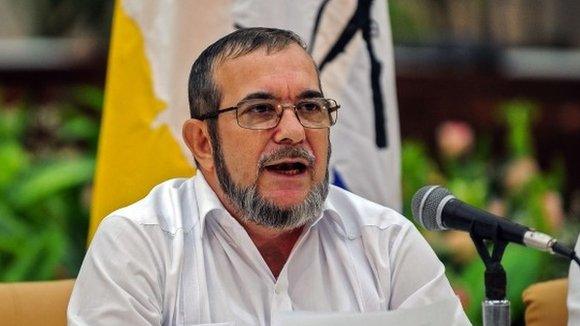Colombian government 'ready to reintegrate rebels'
- Published
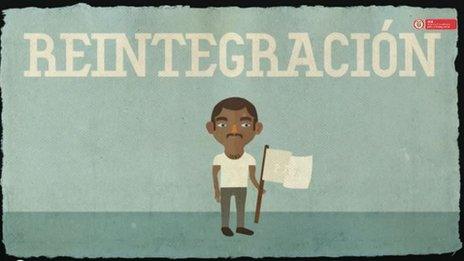
The ACR tries to encourage rebels and paramilitaries to reintegrate into society
Colombia has said it is ready to reintegrate thousands of demobilised rebels into society, as peace talks between Farc rebels and government negotiators enter their 15th round.
The Colombian Agency for Reintegration (ACR) director said the body could look after double the number of demobilised rebels it currently mentored.
Director Alejandro Eder told the BBC it had an "emergency reaction plan".
According to Mr Eder, the ACR is ready to receive up to 40,000 ex-combatants.
The government estimates there are just 7,800 active Farc rebels, with approximately another 10,000 people on the margins of the group.
The National Liberation Army (ELN), Colombia's second-largest rebel group, is estimated to have just under 1,500 fighters.
Ready and willing
The government has been holding peace talks with the Farc since November 2012 and recently signalled its willingness to engage in negotiations with the ELN to end five decades of armed conflict.
Opponents of the talks have argued that a demobilisation of so many rebels at one time, most of whom have little experience of civilian life, would not be feasible.
But Mr Eder said "the Colombian government is ready" and had the experience and funds to deal with a mass demobilisation.
He pointed to his agency's expertise, gained over the past 10 years rehabilitating 56,000 former right-wing paramilitaries and left-wing guerrillas.
According to Mr Eder, the main challenge was to get the support of wider Colombian society and to make people realise the process would take time.
Reintegrating ex-combatants into society normally takes seven years, during which they receive extensive psychological support as well as educational and vocational training.
Lengthy process
The length of the programme depends on the background of each individual, 70% of whom are either completely illiterate or just barely able to read or write their names.
Their average age at the time of recruitment is 16, so few have had much formal schooling.
"They're coming from a completely different society and you essentially have to train them about everything," Mr Eder explained.
"You have to teach them how to cross the road, literally.
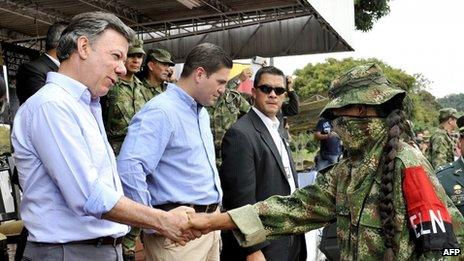
Colombia says any rebel who demobilises will be welcomed back into society
"You have to teach people how to stand in line at the bank, and how to pay [in a shop] because when you have an AK-47 slung over your shoulder, nobody wants to charge you," he says.
Apart from offering psychological help to overcome the trauma of years of jungle warfare, the programme offers educational support.
The main aim is to get all the participants through elementary school education, so they can go on to vocational training and take up jobs.
Mr Eder is particularly proud of one young former female Farc rebel who has made it to university, where she is studying medicine.
"She was forcibly recruited by the Farc when she was eight. She came out of the group at 17, illiterate, with all sorts of psychological problems, no family connections whatsoever," he recalls.
"We started working with her, [giving her] psychological attention, education, we found her family, rebuilt the family relationship and to cut a long story short, 10 years later she is studying in her third year of medicine!"
Mr Eder admitted the young woman was an exception but said it showed that the programme, which costs the Colombian government $90m (£55m) a year, was working.
Lure of illegality
But there are also those who relapse.
Ten percent of those who have gone through the programme have been tried and convicted of crimes committed after they demobilised, according to ACR figures.
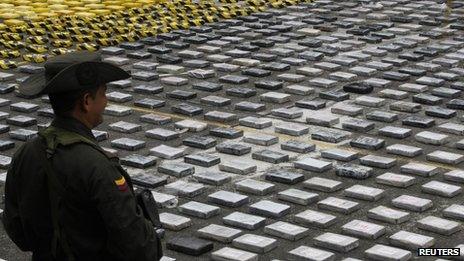
Astronomical profits in drug-trafficking lure some back into a life of crime
And Mr Eder puts the total number of those who have gone back into illegality at between 20% to 25%.
While rejecting allegations that Colombia's powerful criminal gangs such as the Urabenos and the Rastrojos are largely made up of demobilised right-wing paramilitaries as "a myth", he conceded that many of the top leaders of these gangs were former paramilitaries.
"In 2010, we identified 60 of the people who set up these groups. Half of them were former AUC [United Self-Defence Forces of Colombia] commanders."
According to Mr Eder, the lure of Colombia's most lucrative illegal export is hard to resist.
"You have to take into account that we're trying to end a conflict in Colombia that's fuelled by a highly illegal natural resource that is cocaine," he explained.
"When you pull people out of the conflict, there are going to be some people who say, 'Hey, shall I go into this reintegration programme, and go to the psychologist, and learn how to be a baker, or shall I manage this $20m-a-year drug route?'," he said.
"And unfortunately some of them opt for the $20m-a-year drug route.
"That's also why the Colombian police and the Colombian armed forces still have their work cut out for them, even once we demobilise all these people."
- Published16 July 2013
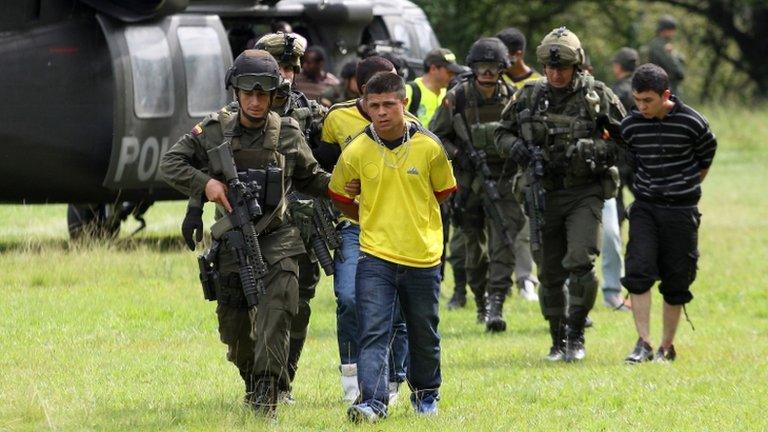
- Published24 September 2015
